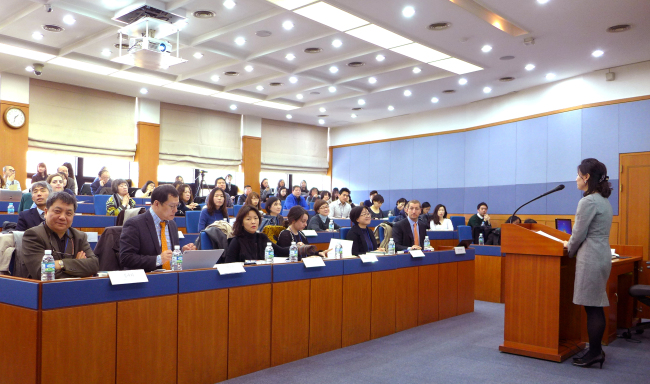Symposium celebrates what’s gained in translation of literature
By Korea HeraldPublished : Jan. 12, 2017 - 18:27
Marking the 10th anniversary of its founding, the Yoo Yeong Research Foundation hosted a symposium Wednesday that reflected on Korea’s progress in literary translation and honored those who have helped bridge the country and the world through cultural reinterpretation.
The event held at Yonsei University bestowed the Yoo Yeong Translation Award to Uhm Il-nyeo, who translated Sarah Waters’ “The Little Stranger” into Korean in 2015. In partnership with the university’s English Literature Research Institute, the foundation selected the final winner from a pool of 500 translated works of English literature in 2015.
The event held at Yonsei University bestowed the Yoo Yeong Translation Award to Uhm Il-nyeo, who translated Sarah Waters’ “The Little Stranger” into Korean in 2015. In partnership with the university’s English Literature Research Institute, the foundation selected the final winner from a pool of 500 translated works of English literature in 2015.

“When people ask me if my English is outstanding, I tell them I’m good at Korean language,” Uhm said upon being awarded. “By normalizing online media in my everyday life, I have easily communicated with authors and asked them pertinent questions about the local culture and context in which their novels were written.”
Last year was fruitful for Korean literature, as a string of novels caught headlines around the world through enhanced translations, many of them by the Literature Translation Institute of Korea and Daesan Foundation.
“The Vegetarian,” a three-part novella by Korean author Han Kang, won the Man Booker International Prize in May last year through British translator Deborah Smith, who was present at Wednesday’s event.
“English and Korean play greatly different roles in the historical and current practice and politics of world literature,” said Smith.
Quoting translator Michael Hofmann, she added, “That English is a bigger language of greater commercial and reputational consequence and potential means that translating into English from almost any other language must be seen within the context of geopolitical power structures.”
Jeong Gwa-ri, who teaches Korean language and literature at Yonsei University, said Korean literature was still in the periphery of world literature, as Western works, particularly the Anglophone ones, dominate readership in America and Europe.
“The importance of culture in our contemporary world is rising day by day. I believe the global popularity of Hallyu and our young people’s deepening conversations with the world are enabled by the excellent translation infrastructure that exists today,” said Lee Jae-yong, vice president of education at Yonsei University.
Cho Dae-ho, director of Yonsei University’s Institute of Humanities, argued that the country’s appreciation of translation was still low, with people relegating it to the shadow of storytelling.
“People tend to view authoring and translating in a hierarchy, as if only storytelling were original and translating were uncreative,” Cho said. “But I think such views misconstrue the intrinsic values of translation, those of transplanting and bridging cultures. Without translation, a work of fiction would not be able to transcend its cultural boundaries, and stay captured a prisoner of parochialism.”
“Translation prolongs the life of original works, breathes fresh new air into them, and insinuates an untrodden path of culture and history for a society,” he added.
By Joel Lee (joel@heraldcorp.com)
-
Articles by Korea Herald



















![[Today’s K-pop] BTS pop-up event to come to Seoul](http://res.heraldm.com/phpwas/restmb_idxmake.php?idx=642&simg=/content/image/2024/04/17/20240417050734_0.jpg&u=)